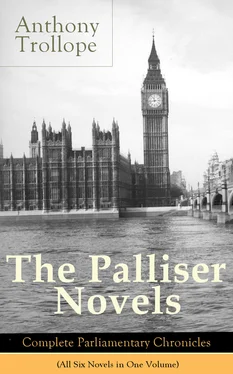And now again as to those home affairs. If I say nothing now I believe you will understand why I refrain. You have cunningly just left me to imply, from what you say, that all my arguments have been of no avail; but you do not answer them, or even tell me that you have decided. I shall therefore imply nothing, and still trust to my personal eloquence for success. Or rather not trust,—not trust, but hope.
The garden is going on very well. We are rather short of water, and therefore not quite as bright as I had hoped; but we are preparing with untiring industry for future brightness. Your commands have been obeyed in all things, and Morrison always says “The mistress didn’t mean this,” or “The mistress did intend that.” God bless the mistress is what I now say, and send her home, to her own home, to her flowers, and her fruit, and her house, and her husband, as soon as may be, with no more of these delays which are to me so grievous, and which seem to me to be so unnecessary. That is my prayer.
Yours ever and always,
J. G.
“I didn’t give commands,” Alice said to herself, as she sat with the letter at her solitary breakfast-table. “He asked me how I liked the things, and of course I was obliged to say. I was obliged to seem to care, even if I didn’t care.” Such were her first thoughts as she put the letter back into its envelope, after reading it the second time. When she opened it, which she did quickly, not pausing a moment lest she should suspect herself of fearing to see what might be its contents, her mind was full of that rebuke which her aunt had anticipated, and which she had almost taught herself to expect. She had torn the letter open rapidly, and had dashed at its contents with quick eyes. In half a moment she had seen what was the nature of the reply respecting the proposed companion of her tour, and then she had completed her reading slowly enough. “No; I gave no commands,” she repeated to herself, as though she might thereby absolve herself from blame in reference to some possible future accusations, which might perhaps be brought against her under certain circumstances which she was contemplating.
Then she considered the letter bit by bit, taking it backwards, and sipping her tea every now and then amidst her thoughts. No; she had no home, no house, there. She had no husband;—not as yet. He spoke of their engagement as though it were a betrothal, as betrothals used to be of yore; as though they were already in some sort married. Such betrothals were not made now-a-days. There still remained, both to him and to her, a certain liberty of extricating themselves from this engagement. Should he come to her and say that he found that their contemplated marriage would not make him happy, would not she release him without a word of reproach? Would not she regard him as much more honourable in doing so than in adhering to a marriage which was distasteful to him? And if she would so judge him,—judge him and certainly acquit him, was it not reasonable that she under similar circumstances should expect a similar acquittal? Then she declared to herself that she carried on this argument within her own breast simply as an argument, induced to do so by that assertion on his part that he was already her husband,—that his house was even now her home. She had no intention of using that power which was still hers. She had no wish to go back from her pledged word. She thought that she had no such wish. She loved him much, and admired him even more than she loved him. He was noble, generous, clever, good,—so good as to be almost perfect; nay, for aught she knew he was perfect. Would that he had some faults! Would that he had! Would that he had! How could she, full of faults as she knew herself to be,—how could she hope to make happy a man perfect as he was! But then there would be no doubt as to her present duty. She loved him, and that was everything. Having told him that she loved him, and having on that score accepted his love, nothing but a change in her heart towards him could justify her in seeking to break the bond which bound them together. She did love him, and she loved him only.
But she had once loved her cousin. Yes, truly it was so. In her thoughts she did not now deny it. She had loved him, and was tormented by a feeling that she had had a more full delight in that love than in this other that had sprung up subsequently. She had told herself that this had come of her youth;—that love at twenty was sweeter than it could be afterwards. There had been a something of rapture in that earlier dream which could never be repeated,—which could never live, indeed, except in a dream. Now, now that she was older and perhaps wiser, love meant a partnership, in which each partner would be honest to the other, in which each would wish and strive for the other’s welfare, so that thus their joint welfare might be insured. Then, in those early girlish days, it had meant a total abnegation of self. The one was of earth, and therefore possible. The other had been a ray from heaven,—and impossible, except in a dream.
And she had been mistaken in her first love. She admitted that frankly. He whom she had worshipped had been an idol of clay, and she knew that it was well for her to have abandoned that idolatry. He had not only been untrue to her, but, worse than that, had been false in excusing his untruth. He had not only promised falsely, but had made such promises with a deliberate, premeditated falsehood. And he had been selfish, coldly selfish, weighing the value of his own low lusts against that of her holy love. She had known this, and had parted from him with an oath to herself that no promised contrition on his part should ever bring them again together. But she had pardoned him as a man, though never as a lover, and had bade him welcome again as a cousin and as her friend’s brother. She had again become very anxious as to his career, not hiding her regard, but professing that anxiety aloud. She knew him to be clever, ambitious, bold,—and she believed even yet, in spite of her own experience, that he might not be bad at heart. Now, as she told herself that in truth she loved the man to whom her troth was plighted, I fear that she almost thought more of that other man from whom she had torn herself asunder.
“Why should he find himself unhappy in London?” she said, as she went back to the letter. “Why should he pretend to condemn the very place which most men find the fittest for all their energies? Were I a man, no earthly consideration should induce me to live elsewhere. It is odd how we differ in all things. However brilliant might be his own light, he would be contented to hide it under a bushel!”
And at last she recurred to that matter as to which she had been so anxious when she first opened her lover’s letter. It will be remembered how assured she had expressed herself that Mr Grey would not condescend to object to her travelling with her cousin. He had not so condescended. He had written on the matter with a pleasant joke, like a gentleman as he was, disdaining to allude to the past passages in the life of her whom he loved, abstaining even from expressing anything that might be taken as a permission on his part. There had been in Alice’s words, as she told him of their proposed plan, a something that had betrayed a tremor in her thoughts. She had studiously striven so to frame her phrases that her tale might be told as any other simple statement,—as though there had been no trembling in her mind as she wrote. But she had failed, and she knew that she had failed. She had failed; and he had read all her effort and all her failure. She was quite conscious of this; she felt it thoroughly; and she knew that he was noble and a gentleman to the last drop of his blood. And yet—yet—yet there was almost a feeling of disappointment in that he had not written such a letter as Lady Macleod had anticipated.
Читать дальше












